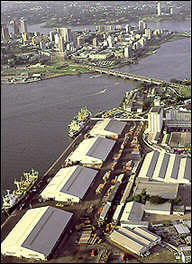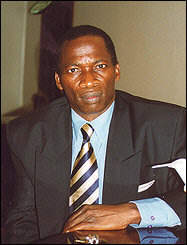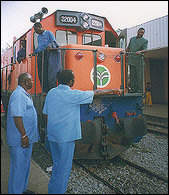 Transport: Privatisation underway Transport: Privatisation underway |

Like the other sectors, the transport sector also suffered as a result of the economic crisis. The economic recovery which started since 1994 resulted in an upturn in this sector. At the Abidjan Port Authority, about 15 million tonnes of goods now arrive yearly including 1 million tonnes on transit to Burkina faso, Mali and Niger.
In the area of air transport, Côte d'Ivoire is one of the 11 member States of Air Afrique. This airline has had a smooth run but there are now some problems which could be solved by the intervention of the various Heads of State with the assistance of France, especially with regard to their will to see the multinational company privatised.
The privatisation of Air Afrique will be finalised in June when its member States will be left with only 33% of the capital. Côte d'Ivoire is an open country and thus several foreign companies make use of Abidjan airport on a regualr basis. Today, there are more than 1.2 million passengers that go through it indicating that the economic recovery is a reality. As regards to the national carrier, Air Ivoire, it is also in the process of being privatised. An international competitive bidding was launched with Citibank providing assistance to the privatisation committee in the area of company transfer expertise. In the views of some Ivorians, Americans and Canadians should show interest in the bidding.
For this to happen, the liberalisation of the air travel industry is expected in such a way that, American Airlines could become interested in Cote d'Ivoire, with the subsequent introduction of an Abidjan-New York line. With respect to that, Côte d'Ivoire together with the FAA, carried out an assessment of the airport a few months ago, in which, among other things, there was the need to train Ivorian civil aviation officers. If the airport is thus certified it will facilitate ties between Cote d'Ivoire and the United States and upon the invitation of the American Secretary of Transport, Cote d'Ivoire was invited last September to Atlanta to witness America's performance in airport safety and security matters.
Air Afrique which was created in 1961, now has a staff strength of 4500. Its Managing Director, the Senegalese Pape Thiam, successor to the Maurician Thu Hang Trivagadum who resigned, is also poised to restore the airline's financial balance. Air Afrique carries out about 450 weekly flights on four continents flying to over 30 countries. "30 different nationalities make up Air Afrique with Head Office in Abidjan, and this is responsible for the airline's interest in multi-culturalism" says the Managing Director.
This airline transports a little more than 1 million passengers and about 60,000 tonnes of cargo annually. It operates a full charter service which will soon grow into an industrial subsidiary. " Its three industrial centres in Abidjan, Dakar and Brazzaville have a personnel comprised of 98% Africans. These use the most up to date technology in terms of maintenance and aircraft equipment, making Air Afrique one of the main North-South vectors of technology transportation. " states Pape Thiam. This multinational airline is black Africa's flag bearer abroad.
Air Afrique's problems go back to its purchase in 1992 of four Airbus A310 under the auspices of Frenchman Yves Roland Billecart. The four aircraft have now been seized by insurers in France who are claiming nearly CFA F 180 billion from the airline. It is in view of this difficult situation that this multinational will be privatised. The hand-over deal is being put together by a European investment bank and an American consulting firm.
Air Afrique's shares will be put up for sale towards the end of the 1999 year. "Air Afrique is a multi-cultural and multinational airline, therefore it would not be unusual that shareholders from Asia, America, Europe and especially Africa would be interested in it" Pape Thiam reassures. Nevertheless, the company is interested in a technological development co-operation. " To maintain our flights, we are going to establish a real hub in Abidjan and we hope that the Abidjan airport will qualify as a first category airport to enable us carry out direct flights from Abidjan to the United States " states the Air Afrique MD. | 
As concerns the national carrier Air Ivoire, the situation is hardly inspiring. This airline has in fact not recovered from its purchase of two Fokker 100 aircrafts. Today, like Air Afrique, it is burdened with debts. Worse still, it no longer has aircrafts. At times, its officers resort to hiring of aircrafts at costs varying from $1,685 to $1,900 each flight hour. "My mission is to first of all put in all I have into Air Ivoire because we are in a period of privatisation" says the Managing Director of Air Ivoire, Vassiriki Savané, before adding "in the case of Air Ivoire, we want to play a partnership role with all airlines. This even includes an American airline. Every partnership in the area of technology transfer such as staff training, which could equip and make our air transport system more dynamic commercially and especially in terms of tourism development, is desirable".
Air Ivoire serves neighboring States and even the UEMOA (West African Economic and Monetary Union ) zone. The airline's objective is to serve the entire continent in the long run. Also, Abidjan-Casablanca and Abidjan-Pointe Noire or Brazzaville flights are being negotiated for the next millennium. Among those wanting to buy over Air Ivoire, Air France has indicated its interest but is yet to make an offer. Other investors are also being awaited.

Apart from air transport, Côte d'Ivoire has a significant network of roads in the neighorhood of 6500 asphalted road and intra-city transport is witnessing a boom for the past ten years. Inter-country transport was not left out of the development in road transport.
Concerning rail transport, it has not thrived since the 1994 privatisation of the sector. The privatisation of Régie Abidjan-Niger (Abidjan-Niger Railway Line) previously responsible for the management and operations of the rail tracks linking Abidjan and Ouagadougou (Burkina Faso) led to the establishment of Sitarail (private company) and Société de Patrimoine Ferroviaire (State-owned). For now, the rail tracks rehabilitation programme of is underway.
In sea transport, the national carrier SITRAM was dissolved. Today, this sector is liberalised and private investors have taken over especially international shipowners. Côte d'Ivoire has two ports, Abidjan and San Pédro. The government hopes to develop the San Pédro Port in order to ease the transport of industrial products from factories hinterland. Other projects such as the Customs reforms are underway. It entails enhancing the performance of the Customs. Thus, land border posts are to be computerised. The average taxation rate was reviewed downwardly since 1 January, 2000 for countries in the West African Customs Union. |

